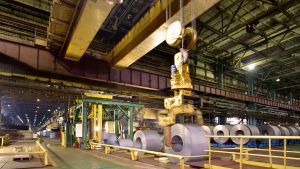When Japan’s Nippon Steel announced its $15 billion bid to acquire U.S. Steel, it was hailed as a potential game-changer – a partnership that could revitalize the American steel giant and create a formidable force to challenge China’s global market dominance. But rather than being seen as a strategic win, the deal is mired in political argument, with national security concerns used as a rallying cry.
Are these concerns grounded in reality, or is this simply political theater?
Nippon Steel’s proposal to merge with U.S. Steel is not just a corporate transaction – it’s a strategic move in a high-stakes geopolitical game. China, which produces over half of the world’s steel, wields significant market power, leaving Western competitors scrambling to keep up. The merger represents an opportunity to strengthen Western steel production and build a counterweight to Chinese influence, through technological advances and the modernization of U.S. steel plants.
Imagine a struggling U.S. Steel facility being outfitted with state-of-the-art upgrades. With billions in investment, the combined entity could increase productivity, boost manufacturing jobs in the United States, and become a powerful global competitor.
This partnership is a chance to future-proof the U.S. steel industry, enhancing domestic economic security while supporting the global supply chain – a significant step toward reducing the Western bloc’s dependence on China.
National security has become the main and most emotive argument against the merger, but in this case, it’s an exaggeration. Japan, far from being a risk, is a crucial U.S. ally – politically, economically, and militarily. Casting Japan’s role in the proposed merger as a national security threat ignores decades of reliable partnership and shared global interests and misses the forest for the trees.
Instead, this deal strengthens ties between the U.S. and Japan. By investing in steel production in the United States, Nippon Steel is contributing to U.S. economic resilience, supporting supply chain security, and enhancing Western manufacturing capabilities. Rather than framing this acquisition as a risk, it should be seen as an opportunity to build a strong bridge that further reinforces the Japan-U.S. alliance against shared strategic challenges, particularly from China.
Yet, the Committee on Foreign Investment in the United States (CFIUS) has been thrust into the center of this debate. Historically, CFIUS reviews focus narrowly on transactions with clear national security implications, such as protecting defense infrastructure or advanced technology. However, the Nippon Steel merger review has become entangled with election politics, particularly in swing states like Pennsylvania where U.S. Steel is based.
Political leaders, unions, and swing-state interests have escalated labor concerns and job security into “national security” objections, with leaders pledging to keep U.S. Steel “American-owned and operated.” While unions have legitimate concerns about the merger’s implications for workers, these matters should be addressed through negotiation, not through outright rejection of the deal. Politicizing CFIUS risks undermining its original purpose as a neutral body and creates an unsteady climate for international business partnerships.
The proposed merger aligns with the concept of “friendshoring” – the new buzzword in international economics – building secure supply chains among trusted allies to reduce reliance on geopolitical rivals such as India and China. The United States has emphasized the need to work with partners like Japan to fortify economic ties and support mutual interests. However, if the U.S. blocks the merger, it will send a protectionist signal that could damage this effort and discourage future foreign investment from allies.
By rejecting Nippon Steel’s bid, Washington risks encouraging reciprocal protectionist measures from other countries, harming U.S. businesses and investments abroad. Friendshoring works only when the United States demonstrates a willingness to cooperate on mutually beneficial economic opportunities, not by blocking allies’ investment efforts on dubious grounds.
While the politics play out, it’s important to remember that U.S. Steel is struggling. Nippon Steel’s bid represents a chance to revitalize steel production in the United States through significant investment, technological upgrades, and modernized operations. This merger is about growth, efficiency, and securing long-term stability for the industry. It aligns with U.S. economic interests by protecting jobs, improving plant operations, and supporting environmental and productivity standards.
In an era where strategic economic decisions require a focus on long-term growth and stability over short-term political calculations, the proposed Nippon Steel-U.S. Steel merger is not just about dollars and corporate control; it’s about strengthening alliances, reinforcing the Western manufacturing base, and creating a competitive edge against China.
Rejecting this deal on unsubstantiated security grounds would not only harm the steel industry’s revival but also undermine the principles of economic cooperation and trust that are essential to global partnerships. To secure U.S. economic resilience, the focus should be on seizing opportunities that advance shared interests and strengthen ties with reliable allies like Japan.
With the U.S. presidential election around the corner, it remains to be seen how the outcome will affect the decision on this merger. If Vice President Kamala Harris, as polls currently suggest, wins the election, there is hope that she will take a fresh look at the deal and reconsider President Joe Biden’s stance, prioritizing strategic alliances and economic pragmatism over protectionist sentiment.

































